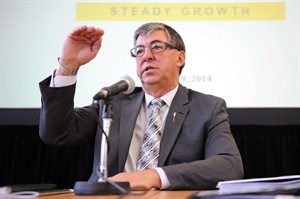
Saskatchewan Finance Minister Ken Krawetz gestures in Regina on March 19, 2014. THE CANADIAN PRESS/Michael Bell
Republished November 27, 2014 - 12:29 PM
Original Publication Date November 27, 2014 - 7:45 AM
REGINA - Saskatchewan's finance minister says the province is still projecting a budget in the black for 2014-15 because higher oil prices earlier this year offset a recent slide that has seen them hit four-year lows.
Finance Minister Ken Krawetz is projecting a $70.9 million surplus — down slightly from his prediction in the spring of $71.4 million.
"We had a very good first six months. The average oil price was over $100 a barrel. It is going to be lower. We know that already," Krawetz said as he delivered the mid-year budget update.
"The revenue from oil is based on 365 days and we still have four months to go."
Oil contracts were tumbling Thursday even as Krawetz spoke. A decision by OPEC to maintain its production output despite a supply glut and lower demand prospects saw prices fall more than $4 to below US$70 a barrel.
Saskatchewan's budget update came a day after Alberta outlined fresh budget figures with a similar message: the pocketbook isn't looking too bad this year due to stronger oil prices early on, but adjustments need to be made looking forward.
The Alberta government is expecting oil to trade at an average of US$75 a barrel for the rest of the fiscal year ending next March.
Saskatchewan is estimating the average price of oil at US$83 per barrel to the end of the 2015 calendar year. The average price for the 2014-15 fiscal year is projected at US$91 per barrel — down from the US$94 per barrel estimated in the budget.
Krawetz said provincial forecasts will differ.
"Our oil makeup is different than Alberta's oil makeup and all of those factors are built into projections," he said.
NDP finance critic Trent Wotherspoon said he's concerned the government is being overly optimistic about oil prices.
"We've seen quite often from this government them sort of pegging numbers where they need to be to achieve an outcome on paper," he said. "I think the Alberta example of a few dollars less than where we are is a more reasonable approach and certainly it does stand out as a place where government should be more cautious."
Krawetz said the government will have to carefully manage spending because of the lower prices.
The mid-year update projects total revenue of $14.2 billion, a $126.4-million increase from the budget. That's due partly to higher potash revenue, increased Crown land sales and more income from Crown corporations.
Potash revenue is up $56.1 million from the budget, Krawetz said. The average potash price for 2014-15 is now projected at US$280 per tonne compared to US$274 in the spring.
Total expenses are being pegged at $14.1 billion — up $126.9 million from the budget, primarily because of flooding-related costs.
"This is our best estimate today," Krawetz said.
His report says the province's growth outlook for 2014 has been revised downward because of a smaller crop yield. Farmers expect to produce 28.8 million tonnes for the year — a decline of just over 25 per cent compared to 2013's record harvest. Falling wheat and canola prices along with the smaller crop size will lead to a "slight decline in nominal GDP."
Krawetz said he's concerned about dropping oil prices, but touted the benefits of economic diversification and job growth.
He also said recent debates about the Energy East pipeline project are important for the province's future.
On Wednesday, Saskatchewan's legislature passed a motion calling for the removal of what the premier calls unnecessary barriers. The proposed $12-billion pipeline would ship more than one million barrels of western crude daily from Alberta and Saskatchewan to oil refineries in Eastern Canada.
"As we open up opportunities for our own oil, we will be able to reduce the differential, and that discounting is affecting the province's finances tremendously," Krawetz said.
News from © The Canadian Press, 2014